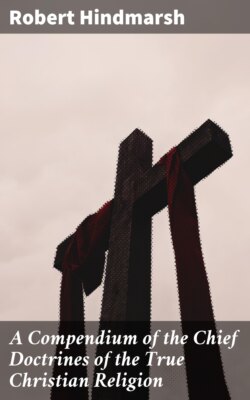Читать книгу A Compendium of the Chief Doctrines of the True Christian Religion - Robert Hindmarsh - Страница 10
The State of Man after the Fall,
Оглавление
VII. The State of Man after the Fall.
THE fall of man is generally understood to have taken place at the time when Eve first, and then Adam, ate of the fruit of the tree of the knowledge of good and evil; till which unhappy moment they are both supposed to have been in their highest state of integrity and perfection. It is likewise the common opinion, that by this one single act of indulgence, in eating of a tree, which not only appeared delightful to the eye, but was thought capable of imparting a degree of wisdom still superior to that which they then possessed, they both precipitated themselves into the lowest abyss of moral depravity, and at once brought upon themselves, and upon their yet unborn posterity, a complete and total ruin. But from an attentive perusal of the Sacred History it may be seen, that the declension of the Most Ancient Church, called Adam or Man, was gradual, commencing with an almost imperceptible propensity or inclination, in the members of that church, to be led by themselves, rather than by the Lord; then proceeding to a more evident state of self-love, until at length by sensual reasonings, by direct acts of disobedience, and by long-continued habits of vice, wickedness prevailed universally, and the whole earth was filled with violence.
The first direct notification of evil, in it's incipient state, is given in the 18th verse of the second chapter of Genesis, where Jehovah God says, "It is not good that man should be alone." All before had been either good, or very good. But from this period evil took it's rise, and gradually accumulated through a series of successive churches, with occasional intermissions of partial restoration, until it arrived at it's full consummation, which is thus described in the 5th and 13th verses of the sixth chapter: "And God saw that the wickedness of man was great in the earth, and that every imagination of the thoughts of his heart was only evil continually. And God said unto Noah, The end of all flesh is come before me; for the earth is filled with violence through them: and behold, I will destroy them with the earth." Yet, notwithstanding this general depravity and wickedness, there were still some left, who retained within themselves the capacity of being restored to a certain degree of integrity, by the reception of charity and faith from the Lord. These were represented by Noah and his family, who were preserved in the ark; and with them a new church was raised up, in the room of that which perished.
The state of man was now changed: his mind, and in some measure his body also, became the subjects of a new organization: for, whereas before the fall his will and understanding, or his two faculties of willing and thinking, were inseparably united, the latter constantly acting in subserviency to the former, after the fall, more especially after it's entire completion, the one acquired the power of being elevated above the other; that is to say, the understanding in it's separate capacity could contemplate truth, and acknowledge the justice of it's dictates, while the will still remained in the love and practice of evil. At the same time external respiration commenced, and together with it external language, sonorous and articulate; to which succeeded a written revelation, or divine rule of life, and external worship, each adapted to the state of man, now so essentially changed from what it had been previously to his fall.
This inversion of the order, in which man was originally created, being that also to which the whole human race are at this day subject, was miraculously effected for the sake of their regeneration, which was in future to be conducted through the external medium of instruction directed to the understanding, in conjunction with the interior operations of the divine mercy. In this way a new will, a new heart, together with new affections of love, and new perceptions of wisdom, were to be, and still may be, formed in man, and he himself restored, if not to the same high degree of perfection as before, yet to a near resemblance of it, and to an equal participation in the happiness of eternal life.
